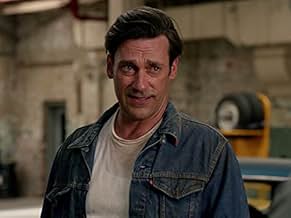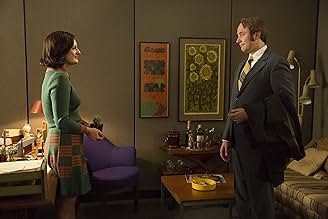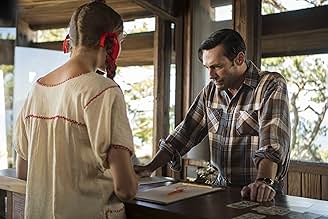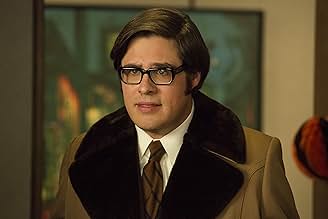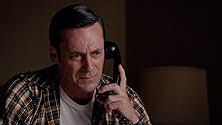Drama sobre uma das mais prestigiadas agências de publicidade de Nova York nos anos 60, e de Donald Draper seu executivo mais misterioso mas extremamente talentoso.Drama sobre uma das mais prestigiadas agências de publicidade de Nova York nos anos 60, e de Donald Draper seu executivo mais misterioso mas extremamente talentoso.Drama sobre uma das mais prestigiadas agências de publicidade de Nova York nos anos 60, e de Donald Draper seu executivo mais misterioso mas extremamente talentoso.
- Ganhou 16 Primetime Emmys
- 166 vitórias e 450 indicações no total
Explorar episódios
Resumo
Reviewers say 'Mad Men' is lauded for its deep character studies, historical accuracy, and nuanced depiction of the 1960s, focusing on the advertising industry. The show delves into themes of identity, power, and societal change, with standout performances, especially Jon Hamm as Don Draper. Its meticulous period detail receives high praise. However, some viewers critique the slow pacing, repetitive storylines, and occasional frustration with character exits and unresolved plotlines.
Avaliações em destaque
10Rob1331
Mad Men is one of my favorite shows ever. It was one of the most talked about shows when it was on, it's the reason I started watching it. I wanted to see if the show could live up to all the hype surrounding it and it did. It surpassed my expectations in every way. It actually ended up being one of my favorite shows. The entire cast is brilliant but this is Jon Hamm's show. His character, Don Draper, is iconic. Hamm was so good that he was nominated for an Emmy for all seven seasons the show was on and even won for best male actor. The show itself was also nominated for an Emmy for best drama for all seven seasons and even won a few times. In all the show won 16 Emmys and had over 116 different nominations. I'll say that again in case you thought it was a misprint...Mad Men was nominated for 116 different Emmy awards! That alone should tell you how legendary this show is. I love it so much I plan on watching it all the way through again in the near future.
The journey is a most interesting one in Don Draper's universe that occupies a time (1960s) in American culture when changes occurred in warp speed. No Pollyanna view of the world, 'Mad Men' explores the full spectrum of human relationships, personality types, and emotions.
The show's creator Matthew Weiner (previously executive producer/writer of 'The Sopranos') takes viewers on a high-ball roller coaster of human experiences that explore pursuit of bliss, the depths of where one can go, and the winding roads of inner angst one must often travel.
'Mad Men' is the ultimate ensemble drama series with grown-up adult themes that drill deep into the human psyche and often self-destructive behavior patterns of the 1960s post-WWII Greatest Generation that populated the high-flying, high-pressure Madison Avenue ad agencies.
Those ad agencies created the culturally iconic images cast through television, radio and print media during that turbulent, mass-consumption decade in American society, when Baby Boomers started taking over the reigns of influence in America, much of it in conflict with Greatest Gen thinking.
There is nothing low key about 'Mad Men'. Tension and conflict is layered throughout the series. Weiner covers a lot of territory of the human experience that exists inside complex personalities and their relationships, and the intense emotions that often accompany them.
As it stands now, 'Mad Men' is the best TV drama series of all-time; I don't believe there is even a close second.
The show received 4 consecutive "Outstanding Drama Series" Emmys (21 total Emmy wins out of 116 nominations) to close out it's relatively brief pre-determined tenure of 7 seasons.
Those who have seen every episode in sequence, experience a level of high-quality TV viewing that sets the bar to the pinnacle, and rivals the best theatrical movies in production, casting, acting, and story-telling.
Matthew Weiner's unique concept alone puts it into a must-try category.
For those who have seen the entire series, it is even better the second, third time around (and one gains value in more rapid linear viewing, rather than having to wait months to see the next season, or a week to watch the next episode).
Marathon binge-viewing of consecutive episodes can be exhausting, but the series' irresistible gravitational force inevitably draws you back into the center of Draper's universe to watch the next episode - You just can't look away.
View 'Mad Men' from episode one, season one. The trip is well worth the time.
👍👍
The show's creator Matthew Weiner (previously executive producer/writer of 'The Sopranos') takes viewers on a high-ball roller coaster of human experiences that explore pursuit of bliss, the depths of where one can go, and the winding roads of inner angst one must often travel.
'Mad Men' is the ultimate ensemble drama series with grown-up adult themes that drill deep into the human psyche and often self-destructive behavior patterns of the 1960s post-WWII Greatest Generation that populated the high-flying, high-pressure Madison Avenue ad agencies.
Those ad agencies created the culturally iconic images cast through television, radio and print media during that turbulent, mass-consumption decade in American society, when Baby Boomers started taking over the reigns of influence in America, much of it in conflict with Greatest Gen thinking.
There is nothing low key about 'Mad Men'. Tension and conflict is layered throughout the series. Weiner covers a lot of territory of the human experience that exists inside complex personalities and their relationships, and the intense emotions that often accompany them.
As it stands now, 'Mad Men' is the best TV drama series of all-time; I don't believe there is even a close second.
The show received 4 consecutive "Outstanding Drama Series" Emmys (21 total Emmy wins out of 116 nominations) to close out it's relatively brief pre-determined tenure of 7 seasons.
Those who have seen every episode in sequence, experience a level of high-quality TV viewing that sets the bar to the pinnacle, and rivals the best theatrical movies in production, casting, acting, and story-telling.
Matthew Weiner's unique concept alone puts it into a must-try category.
For those who have seen the entire series, it is even better the second, third time around (and one gains value in more rapid linear viewing, rather than having to wait months to see the next season, or a week to watch the next episode).
Marathon binge-viewing of consecutive episodes can be exhausting, but the series' irresistible gravitational force inevitably draws you back into the center of Draper's universe to watch the next episode - You just can't look away.
View 'Mad Men' from episode one, season one. The trip is well worth the time.
👍👍
The central character in this show is a deeply damaged man called Don. He has a strong survival instinct, but he's incapable of loving or even trusting. He is running scared. He compensates for his insecurity and emptiness by pursuing primal things that soothing his ego. He has to feel that he's in control, even though he's living on the edge. He tries to be the "Alpha Male" conquering all around him. In reality, he is a juggler about to drop all the balls.
The others in this show are complex human beings whose characters dictate how their lives evolve and ultimately end up.
One interesting character that you follow throughout the series is Peggy. She enters the world of advertising as a total innocent, but as the show progresses, you'll see her become a worldly and powerful business woman.
The show is full of examples of the attitudes and mindset of the 1960s. The type writer was designed "so even a woman can learn how to use it". Everybody smokes, a lot. It's ok for kids to play with plastic bags over their heads. Women are treated in a way that would surely be considered sexual harassment in today's world. These unacceptable things jump out at you and startle you, and give you a flavor of that era.
The show was a hit for a reason. It's very good!
The others in this show are complex human beings whose characters dictate how their lives evolve and ultimately end up.
One interesting character that you follow throughout the series is Peggy. She enters the world of advertising as a total innocent, but as the show progresses, you'll see her become a worldly and powerful business woman.
The show is full of examples of the attitudes and mindset of the 1960s. The type writer was designed "so even a woman can learn how to use it". Everybody smokes, a lot. It's ok for kids to play with plastic bags over their heads. Women are treated in a way that would surely be considered sexual harassment in today's world. These unacceptable things jump out at you and startle you, and give you a flavor of that era.
The show was a hit for a reason. It's very good!
Mad Men is one of the best-written and most ambitious TV shows in some time. It is worth close study, not just for learning how to create a well-structured show but also how to write one that is truly original and potentially groundbreaking. Story world, or arena, is one of the key structural elements in any TV drama (see the TV Drama Class for how to create this element, as well as the other essential structural elements of a successful show). It is where the story takes place and it usually exists within some specific arena that not only delineates a recognizable unit but also has a set of rules, activities and values that defines the characters. One of the strengths of Mad Men is its story world. Instead of the usual arena of cops, lawyers, or doctors, Mad Men takes us into a Manhattan advertising agency in 1960. Besides being totally unique in TV, this story world is extremely detailed. And the detailing isn't simply a matter of the set design, which is fabulous. It is written into every episode. The writers weave all manner of cultural icons of the late 50s-early 60s, including TV shows, ads, and fashion. This has two great advantages. One is the pleasure of recognition. If you were a kid at that time, as I was, the show is a virtual time machine. And even if you weren't, the authenticity and texture immerse you in the world and make you feel that "You are there!" The other great advantage is that this past world tricks the audience into believing that this is how it really was back then. The first thing we notice when we see all of these details is how much the world has changed. Everybody smoked back then. The men were in charge and the women were all secretaries and housewives. That sets up the kicker. By first thinking how much we've changed, we then realize, with even more impact, all the ways we haven't. This story, set in 1960, is really about today, or more exactly, the ways that human nature only puts on a new skin and the same fundamental challenges of creating a meaningful life must be faced by each of us, every moment of every day. Another structural element that immediately jumps out at you if you want to create a TV show or write for one is the desire line. In Mad Men the desire that structures each episode is fairly nebulous, and that's probably going to cut into the show's popularity (I hope I'm wrong on this one). Desire is the main reason almost all TV shows are set in the cop, lawyer, and doctor arenas. These jobs give their shows a simple and repeatable desire line that tracks the episode every week. Catch the criminal. Win the case. Save the life. But of course this is extremely limiting. Most people don't spend their daily lives solving crimes, prosecuting bad guys, and saving lives. So while the desire line on this show may be more nebulous, it is far closer to what most Americans do in their daily lives. These Mad Men are in the business of selling, which, as Arthur Miller pointed out long ago, is the archetypal American action. But they aren't selling a particular product. They're selling desire, some image of the good life that, because it is a fabricated ideal, is always just out of reach. Writer Matthew Weiner's brilliant conception for this show is to connect the selling of desire to America to the personal and work lives of the ad men themselves. The ad men want the image of the good life in America that they are selling to be true, even if they intellectually make fun of the poor suckers out there who buy it. Main character Don Draper is handsome and talented, with a beautiful wife and two cute little kids. But he has some secrets he's keeping like a mistress in the city and he feels a terrible void he has no idea how to shake. Draper is a master at manipulating desire and creating facades, so when he tries to live the promise for real, the "good life" falls apart in his hands. We are in Far from Heaven and American Beauty territory here. And the second episode even had Draper give his own version of the Existentialist credo of Sartre and Camus that was seeping into pop culture during the late 50s (how's that for a sweet detail on a TV show?). We'll have to see whether Mad Men can extend beyond a few episodes without imploding. Besides the lack of a clean desire line, the subject of hollow suburban existence will make it extremely difficult for the writers to develop the show over the long term without beating a spiritually dead horse. In the meantime, I'm going to sit back and enjoy some great dramatic writing, and nowadays TV is the only place you'll find it.
I'll be the first to admit that Mad Men is a show about watching people go to work and live their lives. It should be dull and uninteresting, yet somehow it managed to grip me for a whole 7 seasons and left me wanting more.
The setting is a big part of it. The historical interest of the time (JFK's assassination, the moon landing, England winning the World Cup, to name a few key points in the show) is enough to keep many gripped. It's more than that though. The characters in themselves are worth following and you get invested in them as the seasons progress.
To be frank I didn't like the first season. I just didn't get the formula and was getting close to giving up on the show. I'm glad I didn't though as it only improves from the second season onward.
The setting is a big part of it. The historical interest of the time (JFK's assassination, the moon landing, England winning the World Cup, to name a few key points in the show) is enough to keep many gripped. It's more than that though. The characters in themselves are worth following and you get invested in them as the seasons progress.
To be frank I didn't like the first season. I just didn't get the formula and was getting close to giving up on the show. I'm glad I didn't though as it only improves from the second season onward.
Você sabia?
- CuriosidadesAccording to Jon Hamm, the production's pursuit of historical accuracy is such that series researchers will insist on knowing weather conditions, news items, and popular culture for a particular period related to the script's time frame.
- Erros de gravaçãoEpisodes from Season 1 to Season 3 feature rotary phones with clear plastic finger wheels. These episodes take place before 1964, when the plastic wheel was introduced. Before that, the finger wheels were black and metal.
- Citações
[repeated line]
Don Draper: What do you want me to say?
- ConexõesEdited into Yoostar 2: In the Movies (2011)
Principais escolhas
Faça login para avaliar e ver a lista de recomendações personalizadas
Detalhes
- Data de lançamento
- País de origem
- Centrais de atendimento oficiais
- Idioma
- Também conhecido como
- Mad Men
- Locações de filme
- Empresas de produção
- Consulte mais créditos da empresa na IMDbPro
Contribua para esta página
Sugerir uma alteração ou adicionar conteúdo ausente








